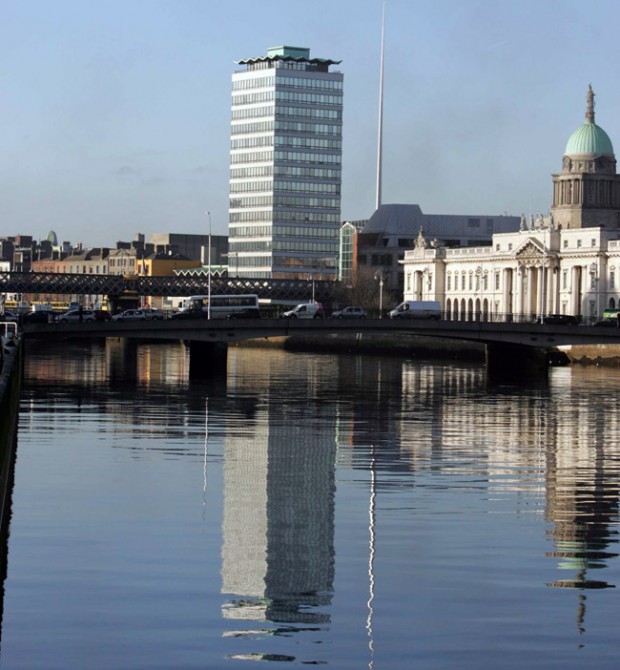2 December 2012 Edition
The Liberty Hall and Sackville Place bombs
1972, British agents arrested after bombs kill two bus workers but no convictions and no answers

• Liberty Hall: Former Taoiseach Jack Lynch admitted he suspected British involvement in the bombings
Former Taoiseach Jack Lynch admitted he suspected British involvement, an assertion that was denied by the London government.
ON 1 DECEMBER 1972, the first unionist car bomb exploded in the 26 Counties during ‘The Troubles’ – at Liberty Hall, then the headquarters of the Irish Transport & General Workers’ Union. In a second bomb near O’Connell Street, two bus workers were killed.
MARGARET URWIN of the Justice for the Forgotten campaign group looks back, 40 years on.
FORTY YEARS have passed since the dark winter evening of 1 December 1972, when the first car bomb exploded, beside Liberty Hall. There were no fatalities but the explosion caused many injuries.
Several minutes later, a second blast at Sackville Place, off O’Connell Street, killed bus driver George Bradshaw (29) and 23-year-old bus conductor Tommy Duffy.
Three minutes before the first bomb exploded, the Belfast News Letter received an anonymous telephone warning that bombs planted at Liberty Hall and behind Clery’s department store would explode at 8:05pm. The caller was said to have spoken with a “Belfast English-type accent”. However, the warnings came too late and the result was devastating: two men dead and 127 people injured. Damage to property was extensive.
Although it was a Friday evening, the Dáil was in session at Leinster House. A Bill to amend the Offences Against the State Act was being debated and a defeat for the Fianna Fáil Government seemed inevitable as Opposition parties and some members of the Government were opposing it on civil liberties grounds. The amendment would admit the opinion of a senior Garda officer as evidence of an accused person’s membership of the IRA. However, the bomb explosions changed the course of Irish history.
When the vote was taken after an adjournment, Fine Gael abstained, allowing the amendment to be passed.
Early investigations centred around four cars. One car, containing the owner’s driving licence, had been stolen four months before in Ballymoney, County Antrim.
The stolen licence of Englishman Joseph Fleming was used to hire three cars from different Belfast companies on 30 November by a man with an English accent. Two of the hire cars exploded at Liberty Hall and Sackville Place. Both these vehicles were already in Dublin on the evening of 30 November, according to a number of eyewitnesses.
The Garda were very proactive in the early days of the investigation, travelling to Belfast and London to retrieve hire agreement documents and interviewing witnesses.
Although the RUC were relatively helpful, the Garda report comments that RUC officers would not permit them to interview some persons “for reasons best known to themselves”. Despite a promising start, the Garda enquiries led nowhere.
Agents arrested
A fortnight after the bombings, two significant but ostensibly unconnected arrests were made in Dublin hotels. British agent John Wyman was arrested at the West County Hotel in Chapelizod on 18 December.
The following day, gardaí apprehended Detective Sergeant Patrick Crinnion of the Crime and Security Branch, Garda Siochána, at the Burlington Hotel, where he was attempting to rendezvous with his handler.
Crinnion was found to have secret documents which he was about to pass on to Wyman. During the trial, Wyman’s notebook was produced. There were references to “RLs”, “car bombs”, and “arrest policy”. When asked to explain these entries he replied that “RLs” were rocket launchers which he said the IRA were using and “car bombs” referred to the explosions in Dublin. Of these, he added: “We are as interested in finding out who did this as you are.” He would not comment on what “arrest policy” meant,
Both Crinnion and Wyman were convicted under the Official Secrets Act and sentenced to three months in jail in February 1973. As they had already served two months, they were immediately released and flown to England.
British agent in Garda blames ‘the Brits’
Shortly before his arrest, Crinnion confided to a fellow garda that “the Brits” had been involved in causing the explosions. He had received this information from his brother-in-law in the British Army, James Lattimore of the Royal Irish Rangers, later Major James Benedict Lattimore MBE.
Over the following months of 1972, a number of stories appeared in the media about possible British involvement in the bombings.
Former Taoiseach Jack Lynch admitted he suspected British involvement, an assertion that was denied by the London government.
A copycat car bomb was planted in Sackville Place on 20 January 1973, killing another young bus conductor, 21-year-old Tommy Douglas, a native of Stirling, Scotland.
The investigation into this bombing was minimal and very little information is known about it.
Nobody has ever been arrested, let alone convicted, for these atrocities.
The claims of British collusion in these and later bombings persist.
Justice for the Forgotten is still pressing the British authorities to make documents available on all the cross-Border bombings of the 1970s. which they failed to disclose to Judge Henry Barron to assist in his Independent Commission of Inquiry.




